Are You Coaching a Team or Leading a Program? 7 Questions to Ask Yourself to Find Out
If you're like me, the to-do list of things your team needs this time of year is unending.
Practice planning, film, and scouting take up hours a day. Not to mention the non-basketball related tasks the job entails. Things like social media, meeting with your athletic director, team meals, fundraising, etc.
Just writing this list makes me feel overwhelmed!
At times like these, it is easy to fall into the trap of focusing exclusively on your varsity team. In some ways, that makes sense. Much contemporary advice centers on the idea of laser focus.
That's good advice. You should narrow your focus to the most important thing.
However, as hard as it might be to accept, the most important thing is not your varsity team. It's your basketball program. Don't lose sight of the forest for the trees.
The Difference Between Coaching a Team and Leading a Program
In our area, the newspaper publishes a Top 25 ranking of area boys and girls teams weekly throughout the season. Without even looking at the list, I could name 8-12 teams who will be ranked every single year.
Why is that? Some would attribute it to talent. Clearly, that makes a difference. Bigger schools with a deeper talent pool have an inherent advantage.
Yet, if you write it off to that alone, you are doing yourself a disservice.
Most of those programs who consistently find themselves high in the rankings have more than talent. They have a program that develops high-level players.
Look at college basketball. During the last 10 years of Jay Wright's tenure, Villanova was arguably the best men's college basketball program in the country. They won two national championships and made three Final Four appearances… even though they rarely had top 10 recruiting classes.
Villanova has had a number of great players. But fans of college basketball understand that Villanova had a program that developed great teams and players.
If you asked coaches what are the characteristics of a Villanova player, many would immediately say playing off two feet, and you can find numerous coaching clips showing their players being in complete control on drives as they exercise this skill. Others might cite their 4 out 1 in offense.
Jay Wright was able to create a program.
How This Relates to Your Program
If someone came to one of your practices, could they immediately tell what your program is about? Hopefully.
But what if they went to one of your freshman or junior varsity practices? Would they see those same things?
If so, that's a great sign. You are on your way to having a true program. If not, you may be lucky enough to have a good team every handful of years when your talent pool crests.
Every coach wants to be successful. But many of us get lost in the weeds of only focusing on our team while the rest of our program flounders.
Building a program doesn't mean you will be a great team every year. What it means is you will maximize your team's ability.
When you're good, you'll be really good. When your talent is down, you'll still be competitive because you've laid a foundation that enables you to punch above your weight.
John Wooden famously defined success as "peace of mind that is the direct result of self-satisfaction in knowing you did your best to become the best that you are capable of becoming." That's what we are talking about here. Maximizing your team's potential every season.

One Hidden Upside of Program-Centric Thinking - Working Smarter, Not Harder
One fear of focusing more on your program than your team is that it could create more work for you. How are you supposed to do all the things mentioned at the start of this article and also focus on your program?
The truth is when you focus on your program, you will end up saving yourself time in the long run. Will you still have to uphold and build your culture daily? Yes. Will you still have to coach your core tactics? Yes.
However, you won't have to start from scratch every year. Your players will already know what your program is about and you will be adding to their base of knowledge rather than creating it.
It will be like running a 100m dash with a 10m head start. You still have to sprint but you've given yourself a much better shot at a good finish.
7 Questions to Ask Yourself If You're Coaching a Team or Running a Program
Set aside some quiet time and reflect on the questions below to evaluate yourself.
1 - Do you use a curriculum?
If you aren't, you need to be! Schools talk about curriculum all the time, and with good reason. A curriculum is hugely beneficial for your coaches and players.
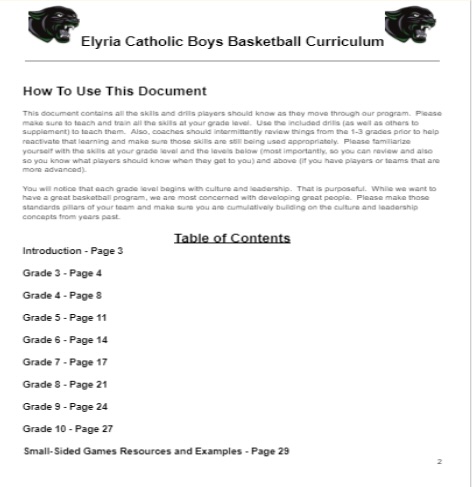
What should a basketball curriculum look like?
It should include the skills and concepts (offense and defense) you want players to learn at each grade/level.
Skills can be further broken down into things like ball handling, shooting, finishing, etc.
Concepts would consist of team tactics and principles. So perhaps it's a simplified version of the offense you run at the varsity level.
For each area (i.e., ball handling), include the skills (a 3rd-grade ball handling standard might be a pound dribble with head up), the drills (practicing your pound dribble with a coach holding up fingers to count), and applicable games (dribble tag).
A key part of building a program is developing culture.
Thus, your curriculum should also include what players should be learning in terms of culture.
It's easy to take for granted that our players know what it means to be a good teammate. They don't - we must teach them! This section could include things like sprinting to help up a fallen teammate or pointing to the passer after a basket.
For your coaches, a curriculum creates clarity and accountability.
Most of the coaches who coach for us want to do a great job. They just need some direction.
This is especially true for those of you who have youth programs you are responsible for. In those scenarios, the coaches are unpaid volunteers who are giving up their time to help.
A curriculum gives them a way to measure the progress of their players and teams. It is also a great tool for you at the end of the season to use when evaluating your coaches.
For players, the curriculum is a measuring stick.
By the end of the season, it shows them what they should be able to do. This can be motivating to those seeking improvement. For this reason, share your curriculum with your players and coaches.
This transparency keeps everyone aligned on goals.
It can also be a good reminder that at the younger levels program development is more important than winning.
2 - Are you visible and engaged at non-varsity events?
If you are the varsity coach, you are most likely attending your team's freshman and junior varsity games. That is a bare minimum expectation.
Do you go beyond that? Do you attend any middle school events? Do you attend any youth games?
If so, great. Being visible is huge!
Sit at the end of the bench - not to coach, but just to be encouragement for the players.
Too many coaches never attend games below the high school level and then don't understand why players feel no loyalty to the program.
Let's go one step further.
Do you know the names of the players at those levels?
The use of names has been proven to be incredibly powerful. For a young player in your program to be called out by name by the varsity coach is tremendously powerful. Are you taking the time to learn the names of the players? If not, start today.
At the high school levels, do you watch your freshman and junior varsity teams practice?
That is a great way to know what's being taught. Furthermore, done respectfully towards your other coaches, it also provides you the opportunity to jump in and coach those players.
They like that because it shows the varsity coach is interested in their development.
You'll also find that your coaches will appreciate this, too. They are looking for guidance, and this gives you a chance to coach your coaches, ensuring they are teaching what you want taught.
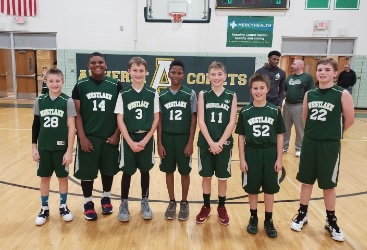
Consider sharing the accomplishments of your youth teams on social media.
This small step is a great way to recognize their achievements and share the great things happening in your program at all levels.
Kyle Johnson, the boys coach at North Olmsted High School (OH), publishes a newsletter that features the good things going on in his program from grades 3-12 (see below).
This is a great way to share program successes and create a program that is aligned from youth through high school.

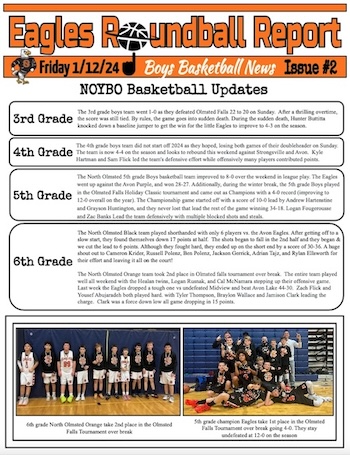
3 - Is Your Youth Program Connected to Your High School Program?
There are a number of ways to do this.
- Conduct youth nights
- Have your varsity players "coach" your youth players
Have your youth teams be recognized at your varsity game. Then, let them play at halftime. This is really exciting for young players and is something they'll remember. Even better is to invite them into the locker room before the game as you meet with your team.
Do a program-wide team-building event
Winter break is a great time to do this. Have all your teams come together for a couple of hours of fun and bonding.
Do some basketball-related contests. Do some team-building games. Share a meal together where everyone at the table must be on a different team.
This allows players to get to know each other and develop real relationships.
Every two weeks require your varsity players to help for 60 minutes of a youth practice. I have found it most effective to assign players to a team so they get to know the coaches and players throughout the season.
One hour every two weeks is a reasonable ask. It is a good way for your varsity players to learn the value of service. I have found our varsity players really enjoyed helping out.
As much as your varsity players will enjoy it, your youth players will enjoy it much more! They look up to the varsity players, and getting to know and work with them is exciting for them.
It's also a huge help to the youth coaches. If you've ever coached a youth practice, you know it can be pretty chaotic. Having a couple of other people there to help is a huge assist.
Finally, ask your players to attend at least one of their youth teams' games during the year and sit on the bench. The youth players will be thrilled to see them!
4 - Do you regularly meet with your coaches?
Not just talk, but meet. Are you intentionally setting aside time to find out what's going on with your sub-varsity teams and provide guidance?
You should be meeting with your other high school coaches every 1-2 weeks.
These meetings do not need to be long. 10-15 minutes should suffice.
Start by having the coaches share. You might want to give them questions in advance to reflect on. By starting with questions, you will get a good idea of what they are seeing.
After they've shared their thoughts, you can give your feedback. Provide 1-2 areas of focus for the next couple of weeks.
Beyond regularly meeting about where each team is at, consider spending 5 minutes of each meeting on a coaching concept or topic you want your coaches to implement.
As the head coach, you need to teach your coaches as well. This is a great forum to build their coaching toolkit.
I would also suggest a weekly email that you ask coaches to respond to.
This can help with getting feedback in between meetings and staying up to date on what's going on with each team. Have 4-5 questions you repeat weekly that your coaches respond to.
5 - Are you seeing your team for what it is?
Teams can largely be categorized into two baskets - competitive and developmental. While your goal is to get your program to the point where it's competitive every year, you might not be there yet.
If your team is in the competitive basket, winning becomes of utmost importance.
You should be doing everything you can to give your team the best chance to win each game. If you only play five players, so be it. If you run more junk defenses to throw off your opponent, so be it.
If your team is developmental, that does not mean winning doesn't matter. Of course, it does! What it does mean is that other factors should be considered.
If you have a developmental team, are there young players you have who would benefit from more experience? Are they comparable to the older players playing in front of them?
If so, consider giving your young players more time.
This is a hard choice for a coach to make. In the short term, it can lead to pain. The older player (and his family) might be upset. However, in the long run, this decision can help your program. You are developing players who will remain in the program, and you will reap those benefits in years to come.
If your team is developmental, spend your time implementing the system you will rely on once they are competitive.
If you are playing a team far superior, don't coach to minimize the margin. If you can win the game through a tactic, go for it.
If not, use the concepts you want to develop.
For example, if you are a fast-breaking team playing a better opponent, resist the urge to walk the ball up. That's not who you want to be. Who cares if you lose by 18 or by 30?
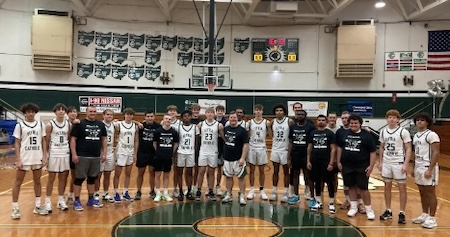
6 - Do you involve your alumni?
It's easy to think of program building in terms of younger players in our program. But almost as important is your effort to keep your alumni involved.
Even if you are a new coach at a school, reach out to former players. Here are some ideas to engage alums:
- Create an email list: Work with your administration to create a list of basketball alumni with emails. If you don't have a list of former players already, you may have to go through yearbooks. While this takes more time, it's worth it! This allows you to communicate with former players easily.
- Send a regular alumni newsletter: Keep former players in the loop of what's going on in the program. Alumni who no longer live in the area really appreciate this.
- Host an alumni game: Former players love coming back and playing. Some coaches have them play their current varsity team. I prefer to have alumni play against each other. If you get enough players to come back, have a couple of games and split them by eras.
- Recognize alumni at games: Have an alumni recognition night. Invite former players and admit them for free. Bring them out at halftime to be recognized.
- Recognize your alumni on social media: For the past couple of years, I have sent out an alumni profile google form. It has about ten questions, some related to their playing career and some related to their current situation.
- Use alumni as mentors and guest speakers: This is a little more involved. If you have alumni who are around a lot and show an interest in your program, consider pairing them up with players to mentor.
Do this with great teams from the past as well on important anniversaries of their accomplishments. For instance, 10 years after winning a conference championship, invite those players back to be recognized.
When you do these game day events, have your alumni come into the locker room. This connects them to the current team.
Every month I try to post one and share it on social media and with our current players.
This takes very little time and is fun for the alumni who participate.
You might pair players and alumni based on career interests, their backgrounds, or other criteria you think would make them a good fit.
The alumni can then develop a relationship with the current players and help guide them as they become adults. Your players will benefit, and you'd be amazed how much your alumni will be grateful to be asked.
For those alums who want to help in a less involved way, asking them to come back and address the team can be powerful. If they can tie their message into a story from their playing days, even better!
When you do this, your alumni get to share a character-building message, and your players get to hear a similar message from someone other than you!
I admire the programs where former players want to come back. That says a lot about their experience and you as a coach.
One thing I enjoy is seeing players who played for me years ago who still refer to me as 'coach'.
That title is an honor. One way you can earn it is by remembering to make your former players part of your program.
7 - Do you have a mission statement that you use to make decisions?
Of all the questions in this article, this may be the most important. It's also probably the easiest to overlook.
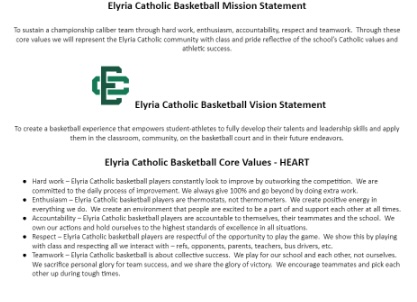
Creating a mission statement is a must. That statement will vary for every coach. Your mission statement should define the type of program you want to be.
At Elyria Catholic, our mission statement reads "To sustain a championship caliber team through hard work, enthusiasm, accountability, respect and teamwork. Through these core values, we will represent the Elyria Catholic community with class and pride reflective of the school's values and athletic success."
Yours will be different.
The first important step is to have one. To create it, set aside some quiet time to reflect on what you'd like your program to be. Then whittle that down to a sentence that captures the main idea.
Having a mission statement is great, but too many people create one and then it's never seen again. Don't do that. Keep it front and center.
The best way to do that is to use it as the criteria for decisions you make for your basketball program. Whenever you are faced with tough decisions, look at it through the prism of your mission statement.
If it aligns with the statement, it's good for your program. If it doesn't, it's probably not. For example, say one of your best players violates one of your team standards in a serious way.
If you enforce consequences for that violation, perhaps sitting that player from part or all of a game, that upholds the standard and furthers your mission. If you don't make the player accountable, you might have a better chance of winning that game, but you've compromised your mission, and thus your program.
I have found using a mission statement to guide decisions to be freeing. It removes a lot of the gray area. It doesn't necessarily make it easier to enforce the right decision, but it makes the right decision much clearer. And that right decision is the one that protects your program.
Final Thoughts - Build A Program That Shines For Years To Come
Coaching is hard. We all have experienced the highs and lows that come with the profession. One goal we all share is to create more of those highs and less of the lows.
Putting your program first gives you the best opportunity to do that. It gives you the chance to be one of those programs that people look at with respect. Players come and go. Some of your coaches will come and go.
But by making the core philosophies of your program your North Star, you can build a program that shines for years to come!
What do you think? Let us know by leaving your comments, suggestions, and questions...
|
||||||||||



 Facebook (76k Likes)
Facebook (76k Likes) YouTube (85k Subscribers)
YouTube (85k Subscribers) Twitter (26k Followers)
Twitter (26k Followers) Q&A Forum
Q&A Forum Podcasts
Podcasts